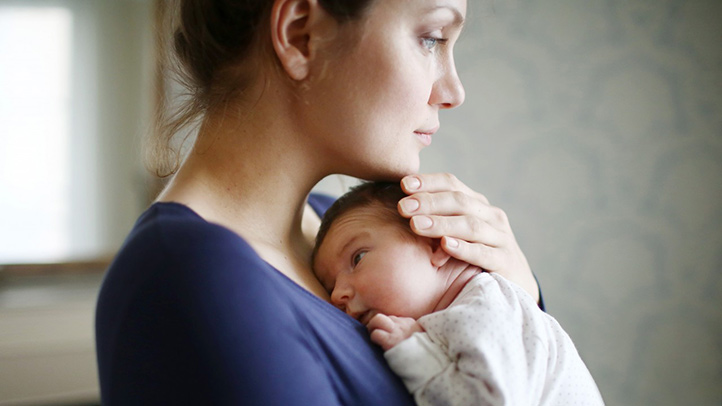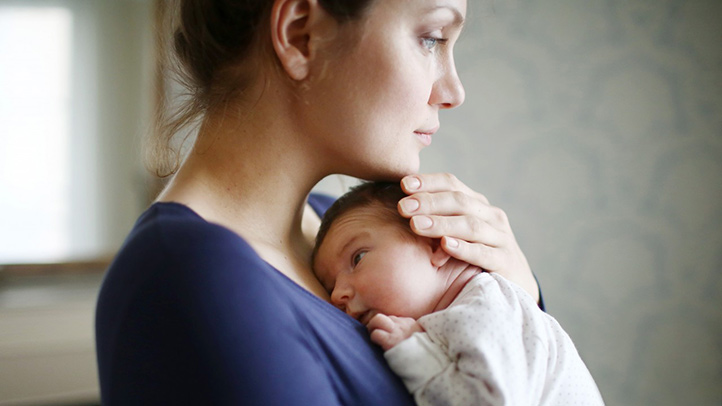Postpartum Depression
Everything you need to know about Postpartum Depression (PPD).
When you become a mother, you instantly become the ultimate guide for your child; the person with all the answers– whether that is true or not. But before you even get to questions about life and love with your child, you might notice some feelings in yourself that you don’t even know how to respond to. If you think you might be suffering from postpartum depression, Kids in the House has the resources you need to check symptoms, understand the disease, and learn how to move forward.
What is Postpartum Depression?
Postpartum depression (PPD) is a medical condition where a woman who has recently given birth experiences intense, unrelenting negative emotions that disrupt her daily functioning. Symptoms can occur during pregnancy, almost immediately after giving birth, or up to a year after childbirth. If the onset of depression is during pregnancy, this is also referred to Prenatal Depression. Depression during pregnancy and after childbirth is known as Perinatal Depression. Postpartum depression is common, with about ten percent of the
... Read more
opulation experiencing a mood disorder related to their pregnancy. It can be resolved within a few months when treated properly, but cases left untreated can persist for up to a year and have long-term residual consequences. Hormonal changes, lack of sleep, and stress from this major life change are thought to contribute to the onset of postpartum depression, but an exact, definitive cause is not known. To overcome a sleep disorder and stress, doctors recommend
best sleep aids supplements. These supplements can help regulate the sleep-wake cycle, reduce the time it takes to fall asleep, reduce stress levels, and improve overall sleep quality.
Some health and genetic factors put women at greater risk of postpartum depression, including:
- History of depression or mood disorder prior to becoming pregnant
- Depression during pregnancy. Depression during the second trimester increases the risk of postpartum depression 3x, and third trimester depression increases the risk 6x.
- Prior history of domestic violence
- Having had an abortion, miscarriage, or still birth
- Death of woman’s mother during childhood
- Family member with mental illness
- Difficulty sleeping before pregnancy
While these factors raise your chances of postpartum depression, they are not a guarantee. On the other hand, women who have no history of depression or other risk factors may still experience postpartum depression, even if they did not with prior births.
Postpartum Depression Symptoms
A diagnosis of postpartum depression must be made by a medical professional, but there are certain symptoms that mothers should be aware of that indicate the need to meet with a doctor. Some of these symptoms are:
- Sadness
- Despair
- Anxiety and/or panic attacks
- Fatigue
- Difficulty bonding with the baby, or difficulty wanting to bond and spend time with the baby
- Inability to Cope or Concentrate– even on the most simple task
- Insomnia or restlessness –even when someone else is taking care of your baby
- Mood Swings
- Loss of Appetite
- Wanting to be Isolated or Withdrawn
- Feeling guilty, shameful, or worthless
- Thoughts of self-harm or harming the baby
Some of these symptoms describe what is known as the baby blues, or postpartum blues. “Postpartum blues are very common. They’re a feeling of emotional vulnerability after the birth of your child,” explains OBGYN Dr. Shamsah Amersi, MD. The difference between postpartum blues and postpartum depression is in the severity and duration of the symptoms. “With the baby blues, even though they don’t feel good, they are mild and they don’t get in the way of a woman’s daily functioning. It doesn’t get in the way of her sleep and shouldn’t get in the way of her appetite,” says Dr. Shoshanna Bennett, PhD, a clinical psychologist and postpartum specialist. Approximately 80% of all women who have given birth experience baby blues, which can resolve itself within two to three weeks without professional treatment or intervention. For these women, having friend and family support can make the necessary difference. On the other hand, postpartum depression feels inescapable. “Postpartum depression is a severe, long-lasting depression that occurs after the birth of the child. It starts out as baby blues, but the symptoms are much more intense and severe,” explains Amersi. A woman with this condition feels the weight of it constantly and can not resolve the feelings of intensifying anxiety, sadness, or inadequacy on their own or with general support of family and friends. Seeking professional counseling or medical advice is always our recommendation when it comes to health uncertainties. As the new caretaker to your child, your health is paramount to both you and your baby’s successful futures. “When a woman starts feeling that these initial factors are intensifying or they are starting to spin out of control and the level of anxiety, the level of sadness, the level of fear, the level of depression is rising, then it is imperative that she see her doctor or a mental health professional right away to be screened and diagnosed for potential postpartum depression or a related mood disorder,” says Kimberly Wong, founder and co-chair of the Los Angeles County Perinatal Mental Health Task Force. Finding the right medical professional for your specific case is not always as easy as a Google search. Most likely, you are already in touch with a pediatrician, OBGYN, and your general health practitioner, but knowing which one to assign your postpartum depression care to depends on their area of expertise, not the initials on their lab coat. “The key here is to listen to the doctor who has the clinical expertise; the doctor that has really been working with women around this issue,” says Bennett, author of Pregnant on Prozac. Bennett suggests beginning your search for treatment by researching psychiatrists. “If you can find a psychiatrist who has that expertise and specializes in this, that might be your best choice. Psychiatrists are taught how to dose [and] how to monitor, so you are not just handed a prescription and sent on your way.” Prescription treatment is just one of the ways you can tackle Postpartum Depression.
Postpartum Depression Treatment
“Postpartum depression is easily treatable once you ask for help,” says “The treatments for postpartum depression include a combination of psychotherapy as well as pharmacotherapy.”
General Treatment
Counseling: Find therapists who do short-term therapy to help create a rapid wellness strategy Joining Support Groups: Seek the advice and support of other parents struggling through the same experience Pharmaceutical Medication: A range of prescriptions, from antidepressants to neurotransmitter inhibitors, exist and can be effective. Actually asking for help might not feel like an enticing option, for a few reasons. “Often women are afraid to come forward. They’re reluctant to go to their doctors and say, ‘I don’t feel well,’ because they think, ‘All that’s going to happen is that I’m going to get a prescription and then I might be stuck on it forever,’” says Bennett. This is definitely not the case for every woman who begins prescription treatment for postpartum depression, but nevertheless, if pharmaceuticals are not for you, alternative approaches are available.
Alternative Treatment
- Acupuncture
- ‘Me’ Time: Allotting time spent away from the baby for things that make you happy.
- Lifestyle Adjustments: Limiting alcohol and caffeine or Increasing exercise.
- Set Realistic Expectations for yourself: Let go of the pressure to be the perfect parent and concentrate on improving your postpartum depression one day at a time.
- Surround yourself with non-judgmental people who prioritize your health and needs.
The time after giving birth can seem overwhelmingly focused on your new baby, but know that your health must never go ignored. It is not a one-or-the-other dynamic. “If mommy is not okay then the family is not doing well. She should definitely not try to tough it out. She should get the help she needs and that she deserves,” says Bennett.
























































